Liam has been the No. 1 most popular boy’s name in the U.S. every year since 2017.
Italian boy names are among some of the most suave names you could give a baby boy.
After all, the Italian language is widely considered one of the world's most beautiful-sounding languages with its rolled 'r's, round and frequent vowels, and melodic, flowing rhythm.
For example, it can make a classic German name like Leonard sound poetic — like Leonardo.
RELATED: 60+ Irish Baby Boy Names That Are Popular In the United States
Leonardo, meaning “brave lion,” was the No. 1 most popular name in Italy in 2023 (the most recent data), according to the Italian National Institute of Statistics, also known as Istat.
Edoardo (Edward), Tommaso (Thomas), Francesco (Francis) and Alessandro (Alexander) rounded out the top-five, per Istat.
If we were to move 4,000 miles west, the most popular Italian name in the United States in 2024 was Luca, which ranked 23rd with 7,959 births, according to the Social Security Administration (SSA).
Enzo (74th) and Leonardo (84th) also ranked inside the top-100 in 2024.
But if you’re looking for unique and rare Italian names for boys, then look no further than Sonnet, which means “little song” in Italian and was given to just 20 baby girls and 5 baby boys in 2024, per the SSA.
And let’s not forget about Amore, the Italian word for “love” that was given to 71 girls and 18 boys in 2024.
Other popular Italian baby boy names include Mattia, Lorenzo, Gabriele, Riccardo and Andrea — all of which rank high in both the United States and Italy, per Istat and the SSA.
If these are the names you like, then you’ll love these Italian boy names we picked out for you below!
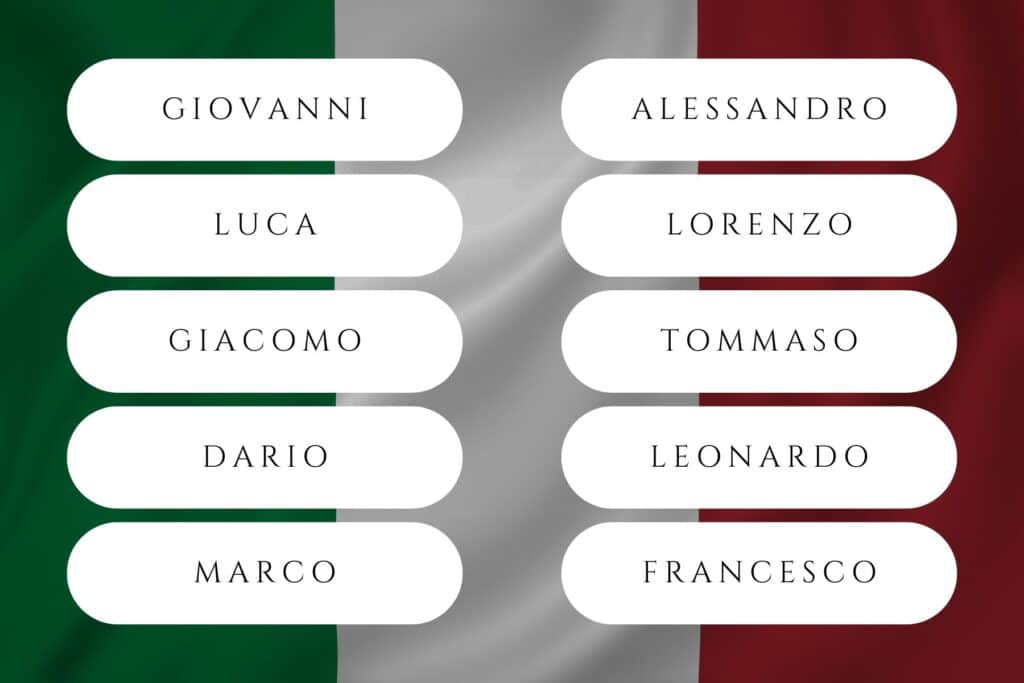
Giovanni
Origin: Italian; Hebrew
Meaning: God is gracious
Giovanni, pronounced joh-VAH-nee or jee-oh-VAH-nee, is the Italian form of John, which comes from the Hebrew name Yohanan and is composed of the elements yo, meaning “God,” and hanan, meaning “to be gracious.”
Luca
Origin: Italian; Greek
Meaning: From Lucania
Luca, pronounced LOO-kuh, is the Italian form of Luke and Lucas, which come from the Greek name Loukanos, meaning “from Lucania,” with Lucania being an ancient territorial division of southern Italy.
Giacomo
Origin: Italian; Latin; Hebrew
Meaning: Supplanter; Holder of the heel
Giacomo, pronounced JAH-koh-moh, is the Italian form of James, which comes from the Latin name Iacomus and Hebrew name Yaʿaqov (Jacob), meaning “supplanter” or “holder of the heel,” via the Bible.
Dario
Origin: Italian; Old Persian
Meaning: Possessing good
Dario, DAH-ree-oh, is the Italian form of Darius derived from the Greek name Dareios and Old Persian name Darayavauš, which are composed of the Persian elements daraya, meaning “to possess,” and vau, meaning “good.”
Marco
Origin: Italian; Roman
Meaning: War-like; Warrior
Marco, pronounced MAR-koh, is the Italian form of Mark and Marcus, which is believed to come from a Roman praenomen derived from the name Mars, referring to the Roman god of war and red planet.
Alessandro
Origin: Italian; Greek
Meaning: Defender of mankind; Man’s helper
Alessandro, pronounced ah-leh-SAHN-droh, is the Italian form of Alexander, which comes from the Greek name Alexandros and is composed of the Greek elements alexo, meaning “to help,” and aner, meaning “man.”
Lorenzo
Origin: Italian; Spanish; Roman
Meaning: From Laurentum
Lorenzo, pronounced luh-REN-soh, is the Italian and Spanish form of Lawrence, which comes from the Roman cognomen Laurentius, meaning “from Laurentum,” with Laurentum being an ancient city in Italy.
Tommaso
Origin: Italian; Aramaic
Meaning: Twin
Tommaso, pronounced toh-MAH-zoh, is the Italian form of Thomas, which comes from the Aramaic name Te’ oma, meaning “twin.” In the New Testament, Thomas was the name of an apostle who doubted Jesus.
Leonardo
Origin: Italian; Spanish; Old German
Meaning: Brave as a lion
Leonardo, pronounced lay-oh-NAR-doh or lee-oh-NAR-doh, is the Italian and Spanish form of Leonard, which derives from the Old German elements lewo, meaning “lion,” and hart, meaning “brave” or “hardy.”
Francesco
Origin: Italian; Latin; Germanic
Meaning: Frenchman; Of French origin
Francsco, pronounced fran-CHESS-koh, is the Italian form of Francis, which comes from the Latin name Franciscus, meaning “Frenchman,” and derives from the Germanic element franko, a type of spear.
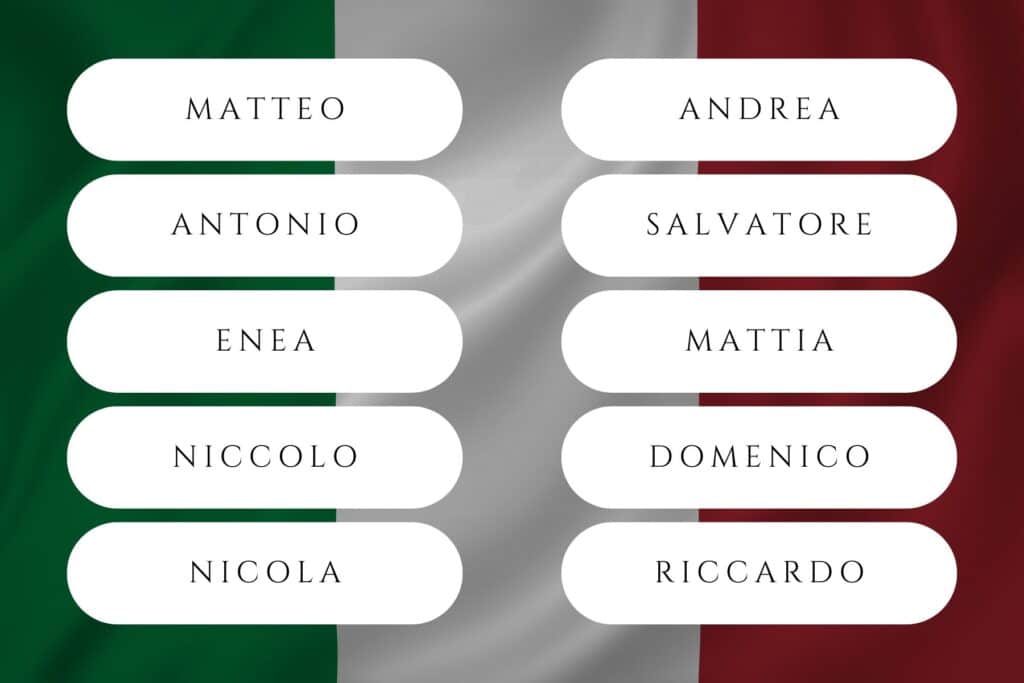
Matteo
Origin: Italian; Hebrew
Meaning: God’s gift; Gift of God
Matteo, pronounced muh-TAY-oh, is the Italian form of Matthew, which comes from the Hebrew name Mattithiah and is composed of the Hebrew elements mattat, meaning “gift,” and yah, meaning “God.”
Antonio
Origin: Italian; Spanish; Roman
Meaning: Priceless (debated)
Antonio, pronounced an-TOH-nee-oh, is the Italian and Spanish form of Anthony, which comes from the Roman name Antonius. It’s sometimes incorrectly linked to the Greek word anthos, meaning “flower.”
Enea
Origin: Italian; Greek
Meaning: Praise
Enea, pronounced eh-NAY-uh or ee-NAY-uh, is the Italian form of Aeneas, which comes from the Greek mythological name Aineias and, ultimately, derives from the Greek word aineo, meaning “praise.”
Niccolo
Origin: Italian; Greek
Meaning: Victory of the people
Niccolo, pronounced nee-KOH-loh, is the Italian form of Nicholas, which comes from the Greek name Nikolaos and is composed of the Greek elements nike, meaning “victory,” and laos, meaning “people.”
Nicola
Origin: Italian; Greek
Meaning: Victory of the people
Nicola, pronounced nee-KOH-lah or nee-KOH-luh, is another Italian form of Nicholas, which comes from the Greek name Nikolaos and derives from the Greek word nike, meaning “victory,” and laos, meaning “people.”
Andrea
Origin: Italian; Greek
Meaning: Manly; Masculine
Andrea, pronounced ahn-DRAY-uh, is the Italian form of Andrew, which comes from the Greek name Andreas and Greek word andreios, meaning “manly” and “masculine,” ultimately via aner, meaning “man.”
Salvatore
Origin: Italian; Latin
Meaning: Safe; Healthy; Savior
Salvatore, pronounced sal-VUH-tor-ay, is an Italian cognate of Salvador, which comes from the Late Latin name Salvator and Latin word salvus, meaning “safe” and “healthy.” It can also be translated as “savior.”
Mattia
Origin: Italian; Hebrew
Meaning: Gift of God; God’s gift
Mattia, pronounced muh-TEE-uh or mah-TEE-uh, is the Italian form of Matthias, which comes from the Hebrew name Mattithiah (Matthew) and elements mattat, meaning “gift,” and yah, meaning “God.”
Domenico
Origin: Italian; Latin
Meaning: Of the Lord
Domenico, pronounced doh-MEH-nee-koh, is the Italian form of Dominic, which comes from the Late Latin name Dominicus, meaning “of the Lord.” It was traditionally a name given to a baby born on Sunday.
Riccardo
Origin: Italian; Old German
Meaning: Brave ruler; Brave king
Riccardo, pronounced ree-KAHR-doh, is the Italian form of Richard, which derives from the Old German elements rih, meaning “ruler” or “king,” and hart, meaning “brave” or “hardy.” Ricardo is the Spanish form.
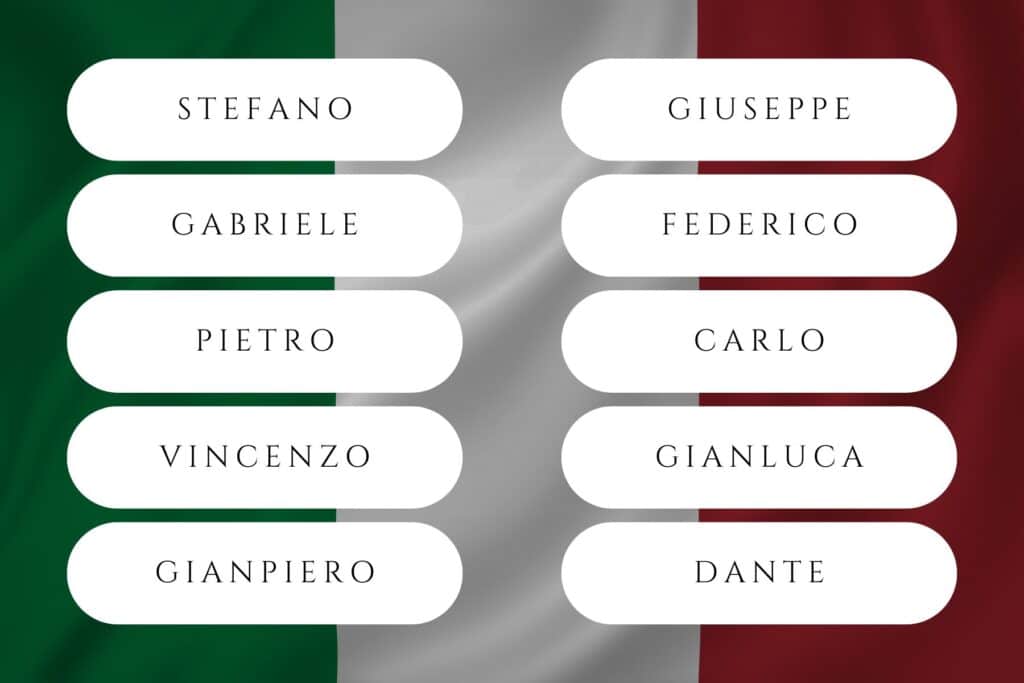
Stefano
Origin: Italian; Greek
Meaning: Crown; Wreath; That which surrounds
Stefano, pronounced STEH-fuh-noh, is the Italian form of Stephen, which comes from the Greek name Stephanos, meaning “crown,” “wreath” or “that which surrounds.” It can be a given name or surname.
Gabriele
Origin: Italian; Hebrew
Meaning: God is my hero; God is my strong man
Gabriele, pronounced ga-bree-EL-ay or GA-bree-el, is the Italian form of Gabriel, which comes from the Hebrew name Ḡavriʾel and is composed of the elements gever, meaning “hero,” and el, meaning “God.”
Pietro
Origin: Italian; Greek
Meaning: Stone; Rock
Pietro, pronounced pee-YEH-troh, is the Italian form of Peter, which comes from the Greek name Petros and Greek word petra, meaning “stone” or “rock.” It’s the first name of Renaissance painter Perugino.
Vincenzo
Origin: Italian; Roman; Latin
Meaning: To conquer; To win
Vincenzo, pronounced vin-CHEN-zoh, is the Italian form of Vincent, which comes from the Roman name Vincentius and derives from the Latin word vinco, meaning “to conquer.” A common nickname is Enzo.
Gianpiero
Origin: Italian; Hebrew; Greek
Meaning: God’s gracious rock; God’s graceful stone
Gianpiero, pronounced jon-pee-AIR-oh, is a combination of the boy Italian names Gianni, a variant of John meaning “God is gracious” in Hebrew, and Piero, a variant of Peter meaning “rock” or “stone” in Greek.
Giuseppe
Origin: Italian; Hebrew
Meaning: He will increase; He increased
Giuseppe, pronounced joo-SEP-eh or juh-SEP-ee, is the Italian form of Joseph, which comes from the Greek name Ioseph and Hebrew name Yosef, via the Hebrew word yosef, meaning “to add” or “increase.”
Federico
Origin: Italian; Old German
Meaning: Peaceful ruler; Peaceful king
Federico, pronounced feh-deh-REE-koh, is the Italian and Spanish form of Frederick, which is composed of the Old German elements fridu, meaning “peace,” and rih, meaning “ruler.” It’s also spelled Federigo.
Carlo
Origin: Italian; Germanic
Meaning: Man; Army
Carlo, pronounced KAHR-loh, is the Italian form of Charles, which comes from the Germanic name Karl and Germanic word meaning “man” or “army.” Feminine forms of this name include Carla and Carola.
Gianluca
Origin: Italian; Hebrew; Greek
Meaning: God’s gracious light
Gianluca, pronounced jon-LOO-kuh, is a combination of the names Gianni, a variant of John meaning “God is gracious” in Hebrew, and Luca, a variant of Luke and Lucas meaning “from Lucania” or “light.”
Dante
Origin: Italian; Latin
Meaning: Enduring
Dante, pronounced DAHN-tay, is a shortened form of Durante, the Italian form of the Late Latin name Durans and word durans, meaning “enduring.” The English forms of this name are Durand and Durant.
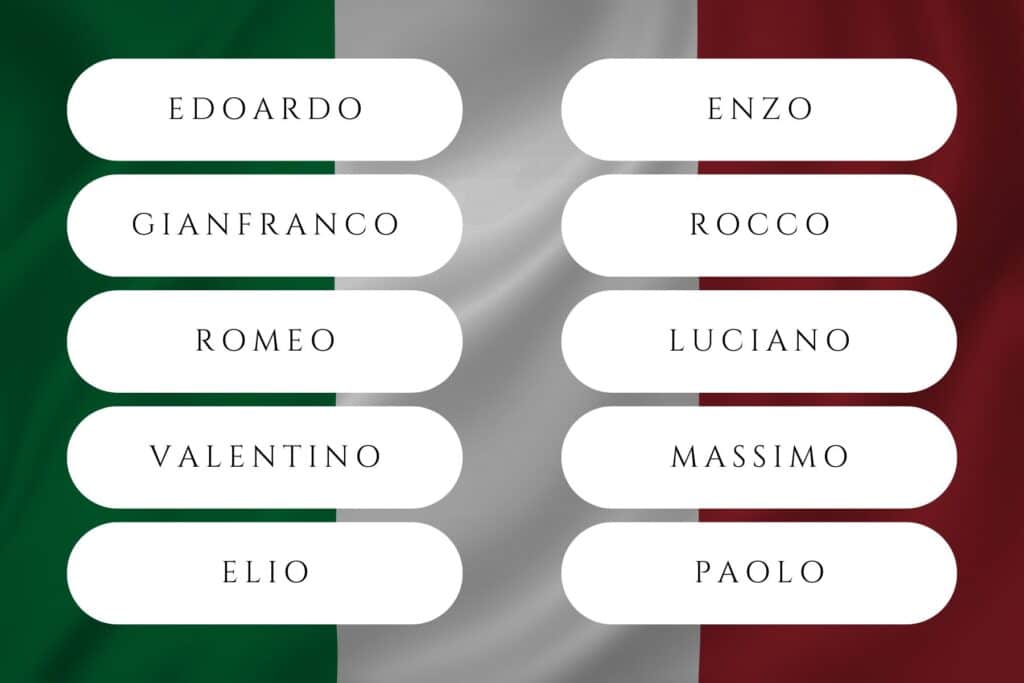
Edoardo
Origin: Italian; Old English
Meaning: Wealthy guard; Fortunate protector
Edoardo, pronounced eh-doh-AHR-doh, is the Italian form of Edward, which is composed of the Old English elements ead, meaning “wealth” or “fortune,” and weard, meaning “guard” or “protector.”
Gianfranco
Origin: Italian; Hebrew; Germanic
Meaning: God is gracious; Franks tribe
Gianfranco, pronounced jahn-FRAYN-koh, is a combination of the names Gianni, a variant of John meaning “God is gracious” in Hebrew, and Franco, a variant of Frank that refers to a Germanic tribe.
Romeo
Origin: Italian; Roman; Latin
Meaning: From Rome; Roman
Romeo, pronounced ROH-mee-oh, is the Italian form of the Latin name Romaeus and Greek name Romaios, both of which meant “from Rome” and were given to someone who was born or lived in Rome.
Valentino
Origin: Italian; Roman; Latin
Meaning: Strong; Vigorous; Healthy
Valentino, pronounced val-ihn-TEE-noh, is the Italian form of Valentine, which comes from the Roman cognomen Valentinus and Latin word valens, meaning “strong,” “vigorous” and “healthy.”
Elio
Origin: Italian; Greek
Meaning: Sun
Elio, pronounced EH-lee-oh, is the Italian and Spanish form of Aelius and Helios, both of which derive from the Greek word helios, meaning “sun.” It’s the name of Timothée Chalamet’s character in “Call Me by Your Name.”
Enzo
Origin: Italian; German
Meaning: Home ruler
Enzo, pronounced EN-zoh, is believed to be an old Italian form of Heinz, which is a German variant of Henry, meaning “home ruler.” In modern times, it’s used as a nickname for Vincenzo and Lorenzo.
Rocco
Origin: Italian; Germanic
Meaning: Rook; Crow
Rocco, pronounced ROK-oh or ROH-koh, is an Italian name believed to derive from the Germanic word hruoh, meaning “rook” or “crow.” Saint Rocco was a 14th-century French saint and patron saint of the sick.
Luciano
Origin: Italian; Roman
Meaning: Light
Luciano, pronounced loo-chee-AH-noh, is the Italian, Spanish and Portuguese form of Lucianus, which comes from the Roman praenomen Lucius and derives from the Latin word lux, meaning “light.”
Massimo
Origin: Italian; Roman; Latin
Meaning: Greatest
Massimo, pronounced MAH-see-moh, is the Italian form of Maximus, which comes from a Roman family name derived from the Latin word maximus, meaning “greatest.” Massimo Ambrosini is a former Italian footballer.
Paolo
Origin: Italian; Roman; Latin
Meaning: Small; Humble
Paolo, pronounced POW-loh or PAH-oh-loh, is the Italian form of Paul, which comes from the Roman family name Paulus, meaning “small” or “humble” in Latin. In the Bible, Paul’s original name was Saul.
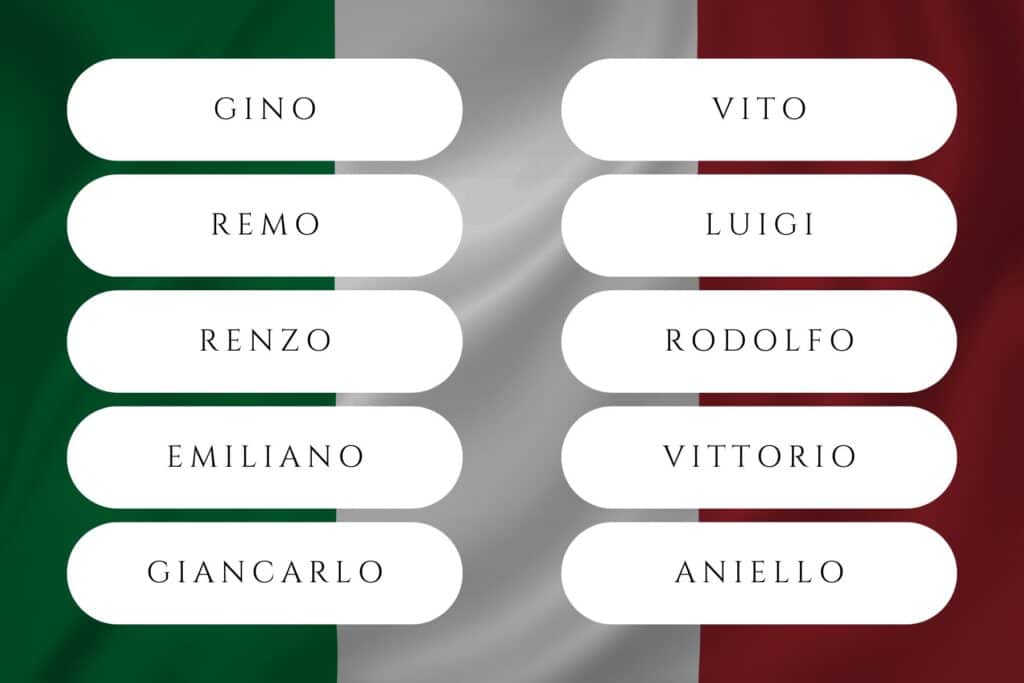
Gino
Origin: Italian
Meaning: Immortal; Famous in battle
Gino, pronounced JEE-noh, is the Italian short form of names ending in gino, such as Ambrogino, meaning “immortal” in Greek and Luigino, meaning “famous in battle” in German. It can also be a short form of Eugenio, the Italian form of Eugene.
Remo
Origin: Italian; Latin; Roman
Meaning: Twin
Remo, pronounced REH-moh or RAY-moh, is the Italian form of Remus, which is believed to derive from the Old Latin word yemos, meaning “twin,” and is considered a diminutive of Romulus and Remus, the twin brothers who founded the city of Rome, according to Roman legend.
Renzo
Origin: Italian; Roman; Latin
Meaning: From Laurentum; Of the light
Renzo, pronounced REN-zoh, is a short form of Lorenzo, which is the Italian and Spanish form of Lawrence and derives from the Roman cognomen Laurentius, meaning “from Laurentum” or “of the light.”
Emiliano
Origin: Italian; Latin
Meaning: Rival
Emiliano, pronounced eh-mee-lee-AH-noh, is the Italian, Spanish and Portuguese form of Aemilius, which comes from the Latin word aemulus, meaning “rival.” Other variants include Emilian, Emilio and Emil.
Giancarlo
Origin: Italian; Hebrew; Germanic
Meaning: God’s gracious man; God’s gracious army
Giancarlo, pronounced jon-KAHR-loh, is a combination of the boy Italian names Gianni, a variant of John meaning “God is gracious” in Hebrew, and Carlo, a variant of Charles meaning “man” in German.
Vito
Origin: Italian; Roman; Latin
Meaning: Life
Vito, pronounced VEE-toh, is the Italian and Spanish form of Vitus, which comes from a Roman name derived from the Latin word vita, meaning “life.” Vito Corleone is the main character in “The Godfather.”
Luigi
Origin: Italian; Latin; Germanic
Meaning: Famous in battle
Luigi, pronounced LOO-ee-jee, is the Italian form of Luis, which comes from the names Ludovicus (Latin) and Ludwig, ultimately derived from the Germanic elements hlut, meaning “famous,” and wig, meaning “war.”
Rodolfo
Origin: Italian; Germanic
Meaning: Famous wolf
Rodolfo, pronounced roh-DOLL-foh, is the Italian and Spanish form of Rudolf, which comes from the Germanic name Hrodulf and is composed of the elements hruod, meaning “fame,” and wolf, meaning “wolf.”
Vittorio
Origin: Italian; Roman; Latin
Meaning: Victor; Conqueror
Vittorio, pronounced vih-TOHR-ee-oh, is the Italian form of Victorius and Victor, which comes from a Roman name derived from the Latin word victor, meaning “winner” or “conqueror.” Vittoria is the feminine form.
Aniello
Origin: Italian; Latin
Meaning: Little lamb; Angel
Aniello, pronounced ah-nee-EL-oh, derives from the Italian word agnello and, ultimately, the Latin word agnus, meaning “lamb.” Some theories suggest it’s a variant of Angelo, meaning “angel” in Italian.
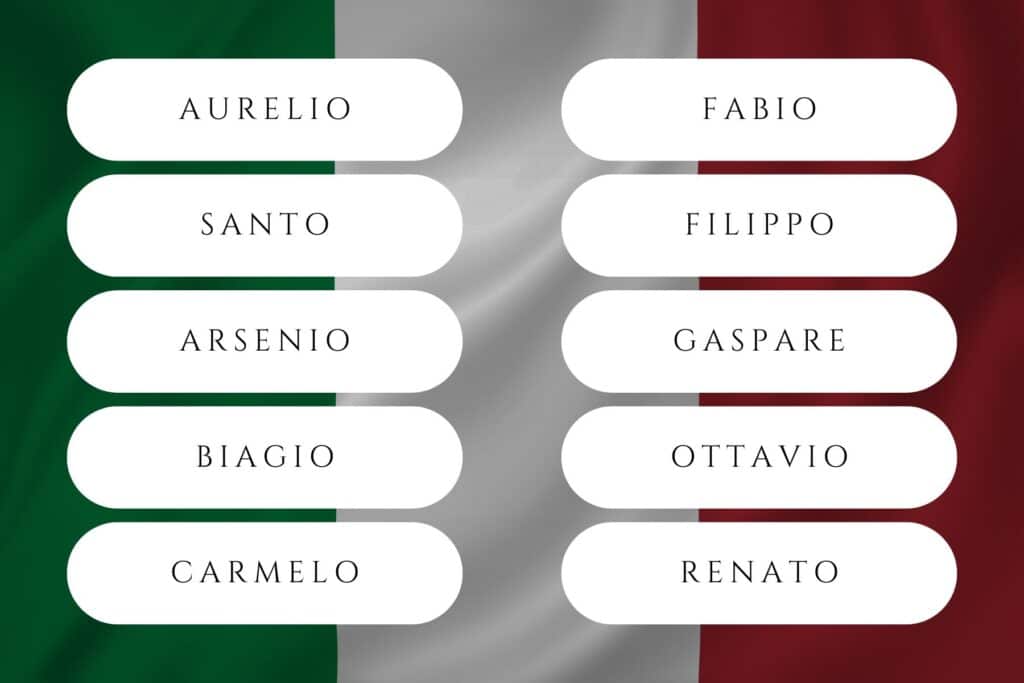
Aurelio
Origin: Italian; Roman; Latin
Meaning: Golden; Gilded
Aurelio, pronounced ow-REH-lee-oh, is the Italian form of Aurelius, which comes from a Roman name derived from the Latin word aureus, meaning “golden” or “gilded.” This was the first name of Italian painter Aurelio Luini.
Santo
Origin: Italian; Latin
Meaning: Saint; Holy
Santo, pronounced SAHN-toh, comes from the Italian word santo, which derives from the Latin word sanctus, meaning “saint” or “holy.” This is the first name of former Italian swimmer Santo Cordorelli.
Arsenio
Origin: Italian; Greek
Meaning: Virile; Strong; Energetic
Arsenio, pronounced ahr-SEH-nee-oh, is the Italian and Spanish form of Arsenios, which means “virile” in Greek. In English, the word virile means “having or characterized high levels of strength and energy.”
Biagio
Origin: Italian; Roman; Latin
Meaning: Lisping
Biagio, pronounced bee-YAH-joh, is the Italian form of Blaise, which comes from the Roman name Blasius and derives from the Latin word blaesus, meaning “lisping.” It can also be spelled Biaggio.
Carmelo
Origin: Italian; Hebrew
Meaning: Garden; Vineyard of God
Carmelo, pronounced kar-MEL-oh, comes from Mount Carmel in Israel and is derived from the Hebrew word karmel, meaning "garden.” It was popularized by Our Lady of Mount Carmel, a title for the Virgin Mary.
Fabio
Origin: Italian; Roman; Latin
Meaning: Little bean
Fabio, pronounced FAH-bee-oh, is the Italian and Spanish form of Fabius, which comes from a Roman name derived from the Latin word faba, meaning “bean.” Feminine forms include Fabia and Fabiola.
Filippo
Origin: Italian; Greek
Meaning: Horse lover; Horse’s friend
Filippo, pronounced FIH-lee-poh, is the Italian form of Philip, which comes from the Greek name Philippos and is composed of the Greek elements philos, meaning “friend” or “lover,” and hippos, meaning “horse.”
Gaspare
Origin: Italian; Hebrew; Old Persian
Meaning: Treasurer
Gaspare, pronounced GAH-spuh-ray, is the Italian form of Jasper, which comes from the Latin name Gaspar and derives from the Hebrew word gizbar and Old Persian ganzabarah, meaning “treasurer.”
Ottavio
Origin: Italian; Roman; Latin
Meaning: Eighth; 8th
Ottavio, pronounced oh-TAH-vee-oh, is the Italian form of Octavius, which comes from a Roman family name derived from the Latin word octavus, meaning “eighth.” It’s the original name of emperor Augustus.
Renato
Origin: Italian; Latin
Meaning: Born again; Reborn
Renato, pronounced reh-NAH-toh, is the Italian masculine form of the Latin name Renatus, meaning "born again" or "reborn." It’s also a popular name among Portuguese- and Spanish-speaking families.
Silvio
Origin: Italian; Latin
Meaning: Wood; Forest
Silvio, pronounced SIL-vee-oh, is the Italian and Spanish form of Silvius, which derives from the Latin word silva, meaning “wood” or “forest.” Silvio Berlusconi was a three-time prime minister of Italy.
What Are the Most Popular Italian Boy Names in Italy?
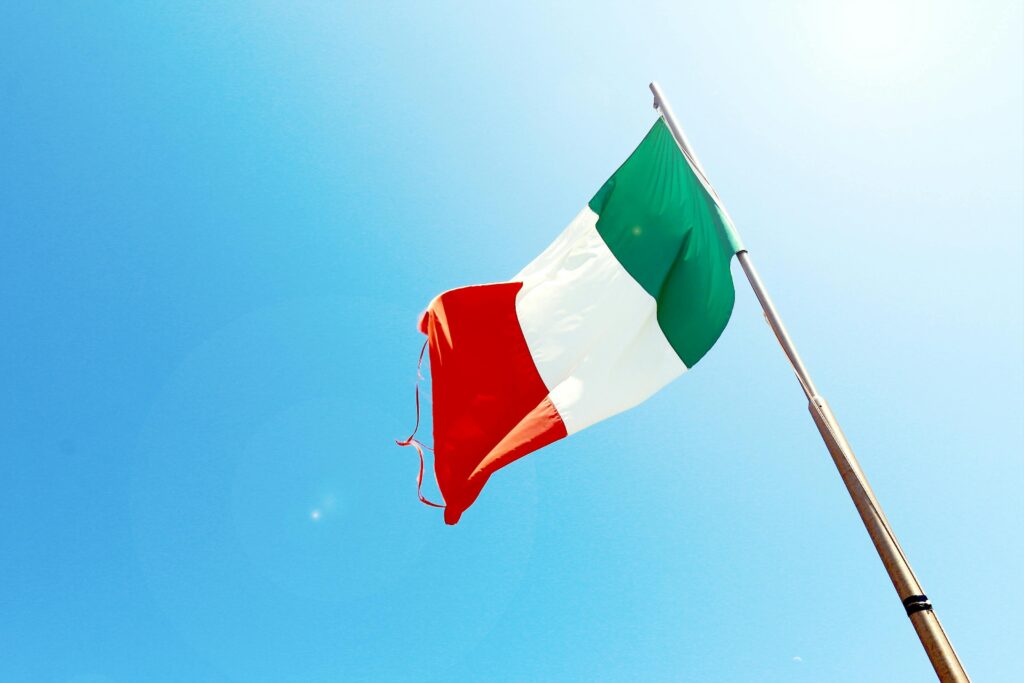
If you’re looking for good Italian boy names to give your son, look no further than Istat.
Much like the SSA does in the United States, Istat releases annual data on first names given to babies the previous year — and this list is always packed with both common and unique options to consider.
Here’s a look at Italy’s top-20 most popular Italian baby boy names of 2023, according to Istat:
| 1. Leonardo | 6. Mattia | 11. Diego | 16. Antonio |
| 2. Edoardo | 7. Lorenzo | 12. Giuseppe | 17. Federico |
| 3. Tommaso | 8. Gabriele | 13. Matteo | 18. Giovanni |
| 4. Francesco | 9. Riccardo | 14. Enea | 19. Filippo |
| 5. Alessandro | 10. Andrea | 15. Nicolo | 20. Samuele |
Other Italian boy names to rank high in recent years include Pietro, Giulio, Gioele, Davide, Michele, Elia, Marco, Salvatore, Vincenzo, Emanuele, Alessio, Jacopo, Giacomo, Ettore and Giorgio.
But if Italian boy names aren’t your cup of tea, then don’t worry — Mod Moms Club is here to help!
ALSO ON MOD MOMS CLUB: 60+ Nature Inspired Boy Names for Your Future Son
Aside from our baby names lists (like the one above), which are uploaded weekly, Mod Moms Club has an extensive baby name generator that can help parents narrow their list down in a matter of seconds!












